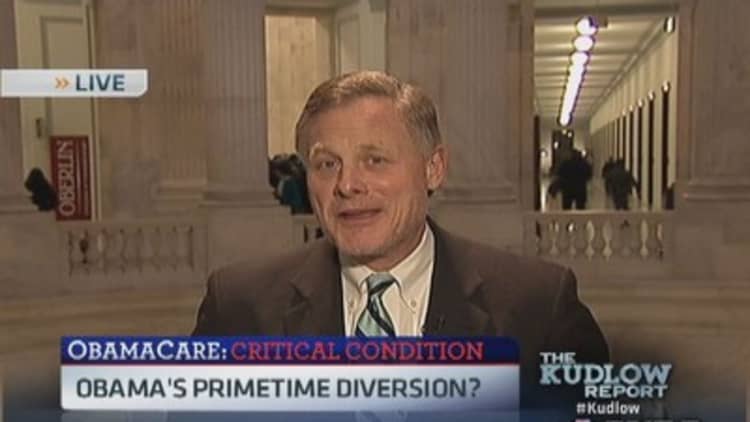A key Obamacare initiative to get hospitals and doctors to better coordinate patient care is "off to a strong start," federal officials said Thursday as they announced $380 million in savings from the program.
Those savings by the Accountable Care Organization program, which aims to hold down Medicare costs and improve patient outcomes, met original projections for the initiative's first year, officials said. And will provide incentives for other medical providers to form their own ACOs, they predicted.
But they also said the fact that only a fraction of the ACOs did well enough to earn bonuses under the program, and that only about half had lower costs than had been projected, reflected the reality that it will take years to change the health-care system from relying on fees for services, as it largely does now, to getting paid for quality outcomes. That ongoing, slow paradigm shift is a major focus for the medical provider community.
"We believe we're off to a strong start," said Jon Blum, principal deputy administrator for the Centers for Medicare & Medicaid Services. "It is possible both to improve the total quality of care, and reduce total costs of care at the same time."
However, Blum said the program will build over time. "This is a significant transformation, and our goal will be to make sure that transformation keeps happening," he said.
(Read more: Obamacare prices may lure employers to exchanges)
The ACO program encourages hospitals, doctors and other medical providers to coordinate their care for individual patients with an eye toward intervening in health issues before they become serious or worsen as well as managing treatment for ongoing issues in a way that both benefits the patient and is cost-efficient.
As an incentive, if the ACO keeps costs under a set amount and meets certain quality benchmarks, they not only reduce the ultimate cost to the government-run Medicare system, but also can keep some of the savings.
Since the program launched in 2012, more than 360 ACOs have been formed. Those groups cover 5.3 million beneficiaries of Medicare, the federal health insurance program for mainly elderly people.
The $380 million in savings included the results of 114 so-called Medicare ACOs, 23 "Pioneer" ACOs, which take on greater financial risk in the program, and 10 Physician Group Practice Demonstration participants.
The 29 Medicare ACOs that earned $126 million in shared savings for themselves by their performance also generated $128 million in net savings for Medicare Trust funds, officials said. The Pioneer ACOs earned $147 million in gross savings—$60 million more than had been estimated by an actuarial analysis last July—and got to share bonuses totaling $76 million of that, officials said.

"These innovative programs are showing encouraging initial results, while providing valuable lessons as we strive to improve our nation's health-care delivery systems," said Health and Human Services Secretary Kathleen Sebelius, whose department oversees CMS.
Montefiore Medical Center in the Bronx section of New York City, recorded the best financial performance of the Pioneer ACOs, with a 7 percent reduction of costs. That led to $23 million in savings to Medicare, of which Montefiore retained $14 million.
Montefiore Vice President of Network Management, Stephen Rosenthal, said the ACO "model allows us to be proactive, to avoid unnecessary costs from occurring." Because of the Bronx's status as one of the poorest areas of the United States, "many of these interventions are focused not only on health problems, but also on behavioral problems."
(Read more: How to navigate the Obamacare maze)
Rosenthal cited the example of a patient named John, a Bronx taxi driver, whose diabetes had been out of control as a result of his job schedule and other factors, leading to 42 separate emergency room admissions in a single year.
The ACO intervened in John's treatment, and assigned a diabetes educator to him. In the year when he was actively being monitored by the ACO, Rosenthal said, John went to the ER just once.
Meghan FitzGerald, president of Cardinal Health Specialty Solutions, who also teaches a class in "Business of Healthcare" at Columbia University, said Montefiore and the other providers involved in ACOs "represent a larger movement towards value in health care."
(Read more: No Medicaid expansion? There's an Obamacare tax hit)
"Some of the best results are seen when all stakeholders—physicians, payers and patients are engaged and incentives are aligned," FitzGerald told CNBC.com. "Working with these groups together was once considered unheard of but in a new era of health care, eliminating waste and promoting appropriate care are a result of 360-degree partnership, which has been helped by public-company innovation and technology."
—By CNBC's Dan Mangan. Follow him on Twitter @_DanMangan.


